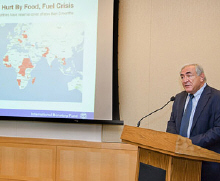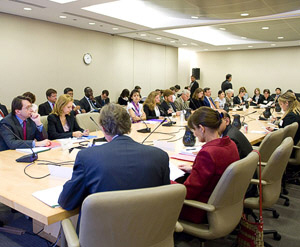The IMF and Civil Society

Strauss-Kahn said that the 'shock' resulting from the price increases remains severe and that 50 low and middle income countries are vulnerable to overall inflation
The Other Crisis: Food, Fuel Prices Pose Continued Risk
September 26, 2008
At a time of deep global concern about the crisis in U.S. financial markets, it is essential that we not lose sight of the other crisis that is having a direct impact on the world's poor — surging food and fuel prices. That was the message from IMF Managing Director Dominique Strauss-Kahn at a briefing to announce an update on the Fund's work related to the food and fuel crisis.
Speaking to the media and representatives of civil society organizations, Strauss-Kahn said that the "shock" resulting from the price increases remains severe: some 50 low and middle-income countries remain vulnerable to deteriorating balance of payments and overall inflation.
The new study, which updates a July IMF analysis of the macroeconomic impact of food and fuel costs, shows that prices remain well above their levels at the onset of the recent price surges.
Strauss-Kahn stressed that while the international community is currently focused on the ongoing financial crisis in advanced economies, "it is important not to lose sight of the other crisis' — the continued debilitating impact of food and fuel hikes on some of the world's poorest countries." About 60 representatives from the media, think tanks, government agencies, and CSOs attended the event.
Call for bolder action
After presenting the IMF's findings and recommended policy responses, Strauss-Kahn said that the international community's response so far has been disappointing and appealed to donors "to do what they said they would do." He also gave an update on the IMF's support to affected countries, which has taken the form of policy advice and technical and financial assistance.
"While food and fuel prices have eased from recent peaks, unfortunately they remain well above their levels at the onset of the recent price surges," Strauss-Kahn said. "What this means for a large number of countriesparticularly in Africais a significant shock." He called for "bolder action" from the international community in terms of additional aid and action to help vulnerable countries.
The original July report warned that the price surge was most acute for import-dependent poor and middle-income countries, posing the risk of balance of payments problems, higher inflation, and worsening poverty.
The Fund's updated assessment shows that the impact of food and fuel price increases on developing countries, far from diminishing, has continued to mount since its previous report last July. As of mid-September, oil prices are around 40 percent below their mid-July peaks, but still double the levels recorded at end-2006. Similarly, food prices have eased 8 percent from their June peak but are still above end-2006 levels.
Joining Strauss-Kahn were Hugh Bredenkamp, Patricia Alonso-Gamo (both from the IMF's Strategy, Policy, and Review Departmentformally known as the Policy Development and Review Department), Thomas Helbling (Research Department), Benedicte Christensen (African Department), and Sanjeev Gupta (Fiscal Affairs Department). Through a slide presentation, Bredenkamp gave a more detailed overview of the IMF's work and then moderated a short Q&A session.
The Fund's View
Audience members raised questions about the linkages between the current financial crisis and food and fuel crisis. Christensen responded that the financial crisis so far has had a less direct impact on African countries, but that there will be some impact on commodity prices — for example, if they decrease further due to the global slowdown. And while growth in sub-Saharan Africa has picked up more than in other regions, the region is not immune. All countries will be affected in some way, but how exactly will vary from country to country. Bredenkamp added that there can be financial as well as real spillovers, especially to emerging market economies. Some low-income countries that have been receiving rising levels of private capital flows might also face difficulties in the future.

The audience listening to IMF staff update on the food and fuel crisis.
Peter Bakvis of the International Trade Union Confederation pointed out that the IMF's recommendation for governments to target of assistance programs to specific population groups poses difficulties for countries that lack capacity to administer these programs. He said there is a risk that this money would fall through the cracks. He asked if general subsidies were not preferable. Gupta replied that the Fund recognizes these difficulties but pointed to a number of things governments can do — for example, to raise more gradually the prices of goods that are being consumed primarily by the poor, or use an indirect way of targeting the poor, possibly by looking geographically at which areas are more affected and transferring more assistance to these areas.
Bakvis also questioned the Fund's view that governments need to take care in raising wages in response to the higher food and fuel prices because of the potential fiscal pressures. Bredenkamp responded that there is no way to avoid some downward adjustment to real incomes in the face of a major terms of trade shock, but determining what wage rates would be sustainable would vary according to country circumstances.
Also on the issue of subsidies, Christensen gave the example of Senegal, where authorities removed price controls and subsidies after a poverty and social impact analysis concluded that the well-to-do were profiting from these measures more than the poor. Now Senegal has instituted a school feeding program instead. Togo made overdue payments to civil servants who were affected more by the crisis than subsistence farmers. The country also introduced targeted subsidies for fertilizers and seeds.
